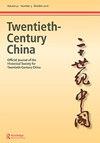The "Acid Test" of the Revolution: Demobilization and the Collapse of Chiang Kai-Shek's Military Coalition in 1929
IF 0.4
Q1 HISTORY
引用次数: 0
Abstract
Abstract:In early 1929, Chiang Kai-shek initiated a demobilization movement that he saw as an essential step in breaking the cycle of destructive "warlord" conflicts and putting the new Nanjing government on a sound financial footing. Many Chinese shared this goal, with some describing demobilization as the critical issue upon which the future of the Republic of China depended: a proverbial "acid test" of the Nationalist revolution. Though unsuccessful in the end, Chiang came close to achieving his goal. He built a broad consensus among the major military commanders in support of a plan to reduce the size of China's military, to restrict military spending, and to create a centralized command structure. This article reexamines the course of events in early 1929 in order to better understand this demobilization movement and the reasons for its failure, which had such profound implications for the Nationalist regime.革命的“严峻考验”:1929年复员与蒋介石军事联盟的崩溃
摘要:1929年初,蒋介石发起了一场复员运动,在他看来,这是打破“军阀”冲突恶性循环、为新南京政府建立健全财政基础的重要一步。许多中国人都有同样的目标,一些人认为复员是关系到中华民国未来的关键问题,是对国民革命的“严峻考验”。虽然最后没有成功,蒋还是接近了他的目标。他在主要军事指挥官中建立了广泛的共识,支持削减中国军队规模、限制军事开支和建立集中指挥结构的计划。本文重新审视1929年初的事件进程,以更好地理解这场对国民党政权产生深远影响的复员运动及其失败的原因。
本文章由计算机程序翻译,如有差异,请以英文原文为准。
求助全文
约1分钟内获得全文
求助全文

 求助内容:
求助内容: 应助结果提醒方式:
应助结果提醒方式:


